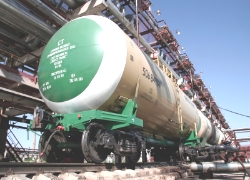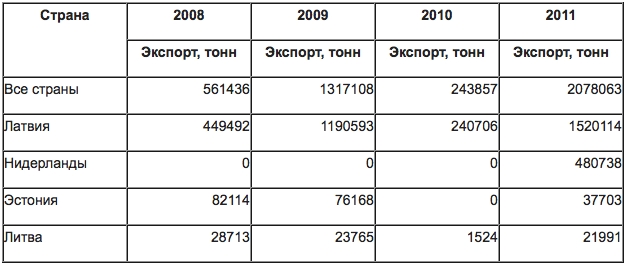Russia has known about Belarus smuggling petroleum products for a while
40- 21.06.2012, 10:43

A very interesting connotation appears in the Russian media who report on the Belarusian export of dissolvent.
The rage about the lost fees from the missed opportunity to re-export petroleum products regards only the events of 2011-2012.
But, as Dmitry Ivanovich writes on the website Nashe Mnenie, Belarus previously was the export leader in this sphere. So why doesn’t Russia investigate what happened in 2008-2009? A comparison of two charts can give a reply. Import of virgin petroleum from Russian during 2007-2011:

And export of dissolvent (code ТН ВЭД № 3814) for the same period: 2011

The volumes of the virgin petroleum import in 2008-2009 are very similar. In 2011 Holland, a traditional buyer of petroleum products from Belarus becomes a new counteragent. Obviously, before 2011 Holland never bought our dissolvent. What is even more interesting, in 2011 Holland imported only 31 thousand tons of this group of dissolvent. And once again, Belarus is not among the leading suppliers.
According to Izvestiya, in the second half of 2011 petroleum product supplies from Belarus (distillates) that involve export fees, gradually decreased with 20% compared to the second half of 2010, while the same volume is replaced with supplies of the dissolvent. And once again, a sudden increase of import of virgin petroleum from Russia.
In January 2012, there was a short oil war. Belarus lost the right for a reduced export fee for its petroleum products, which is followed by the volumes of dissolvent export. For example, in December 2009 the export of dissolvent made 170 319 tons, in February 2010 the dissolvent wasn’t exported at all.
In 2011 the export volume of the dissolvent rose in November-December, when the documentation of the Customs Union was adopted.
What do these facts tell us? Russia is perfectly aware of how Belarus’ world leadership in dissolvent export is possible. And Russia knows very well how to destroy this leadership. So nobody should make any confusion around the Russian Federal Customs Service being interested in dissolvent export from Belarus. It is hard to ignore the annual supply of 2011 that was growing all year long and particularly intensively in May 2011.
So, compensation measures have nothing to do with the growing concern. Russia has learnt to use carrot and stick in its relationship with the Belarusian leadership. And now the question is only about the price of the reciprocal services. Obviously, this is not another integration attempt. There must be clarity in this situation since the price is very high.
By the way, it is possible to calculate the exact amounts of money involved in the buying costs of virgin petroleum (thousand $):

In 2008, Belarus sold dissolvent for $367 763 thousand. In 2009, Belarus made $549 641 thousand for the volume of dissolvent that equals the volume of virgin petroleum purchase. In 2011, Belarus sold 1.5 mln tons of dissolvent for $1 110 294 thousand.
Russian experts have different numbers based on the average losses of $300 per ton in 2011. But the calculations should also include possible losses from the “finishing” costs, additional operations, possible overpricing of virgin petroleum from Russian suppliers.
In the result, the profit from the unpaid fees – in case the goods were smuggled – could be distributed among the parties:
- Russian suppliers who were selling virgin petroleum at good prices couldn’t use such schemes alone;
- Belarus made the goods more ”dissolvent-like”;
- Latvia got to load railways and harbors with transportation services.
Buyers of the dissolvent in their turn could get a certain discount on further operations of “restoration” of petroleum from the dissolvent. Finally, the Russian budget sustained some losses but not without a consent from the persons responsible for this scheme. Apparently, today these persons are not happy about the current profit distribution. The time will show what will happen to this simple scheme.










